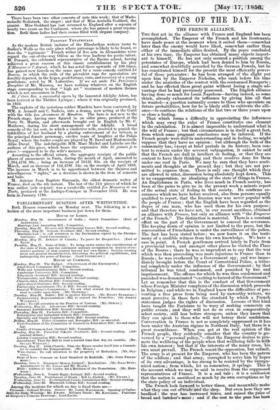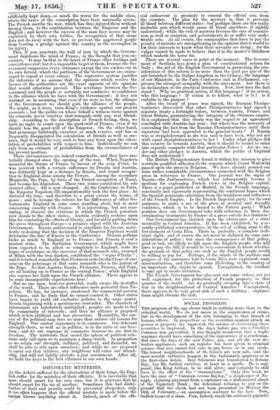TOPICS OF THE DAY.
'1/1k. FRENCH ALLIANCE.
TEM first act in the alliance with France and England has been accomplished. The Emperor of the French and his lieutenants have made peace at the moment when it suited them—somewhat later than the enemy would have liked, somewhat earlier than either of the immediate allies desired. By the peace concluded at his own time, the Emperor has obtained many objects import- ant to himself. He has not only secured a position among the potentates of Europe, which had been denied to him by Russia, and somewhat doubtfully, accorded by the German. Powers, but he has constituted himself for the present the most efficiently power- ful of those potentates : he has been avenged of the slight put upon him by the Emperor Nicholas, who sank before his time under the anxieties of the contest with the contemned Bonaparte ; and he has effected these great gains without losing a single ad- vantage that he had previously possessed. The English alliance having done so much for Louis Napoleon—having indeed, as some think, already exhausted its influence by giving him all that he wanted—a question naturally, occurs to the who speculate on future probabilities, how far he is likely still to cultivate the alli- ance—to continue the relations of the last two or three years upon so close a footing. That which forms a difficulty in appreciating the influences which may sway the ruler of France constitutes one element in the calculation. It is almost impossible to understand what is the will of France ; but that circumstance is in itself a great fact, from which some pregnant conclusions may be inferred. If the French people were dull in understanding and in feeling, we might suppose that they have no opinion : but although the bulk of the community has, except at brief periods in its history, been con- tent to remain under the severest subjugation, it cannot be said that the French are dull in intellect or feeling, or that they are content to have their thinking and their resolves done for them under one roof in Paris. We may be sure that they have senti- ments and thoughts at the present day ; but they are not per- mitted to express them. There is only one thought which they are allowed to utter, discussion being absolutely kept down. This is no exaggeration, no idealizing of the state of things in France. An Englishman in Paris, who lives lunch in French society, has been at the pains to give us in the present week a minute report of the actual state of feeling in that society. He confirms as- surances which we have before received, also from persons equally qualified to report, that the Russian war was never popular with the people of France ; that the English have been regarded as the dupes of one man, who has used them for his own purpose; and that therefore we have not, in our recent sacrifices, obtained an alliance with France, but only an alliance with "the Emperor of the French." The distinction is material. There is a constant effort on the part of the Government to conceal the severance. The keeping down of opinion is not limited to the press, but the conversation of Frenchmen is under the surveillance of the police. The fact has been stated before ; we now learn it on the testi- mony of a credible witness from his own knowledge. We have a case in point. A French gentleman arrived lately: in Paris from a provincial town, and amongst other places he visited the Place of the Bourse ; there he was so imprudent as to say that the war which was then proceeding was more injurious to France than to Russia ; he was overheard by a Government spy, and was imme- diately brought before the Court of Correctional Police, a tribu- nal completely under the influence of the Government ; by that tribunal he was tried, condemned, and punished by fine and imprisonment. The offence for which he was thus condemned and
punished was denominated "exciting to hatred of the Government." Let us remember that this is the conduct of that Government whose Foreign Minister complains of the discussion which proceeds in Belgium ; and while we in England know the difficulties of pre- venting a free press from being used by unworthy writers, we i
must perceive in these facts the standard by which a French statesman judges the rights of discussion. Lessons of this kind. have taught the Parisians to be wary of making comments on public events ; and they will not do so even in comparatively select society, still less before strangers, unless they know that they can speak to those who will not betray their confidenect. Conversation in France is not so completely suppressed as it has been under the Austrian regime in Northern Italy, but there is a great resemblance. When you get at the real opinion of the French people, they evidently consider that the country is go- verned by a "personal policy,"—that the Emperor desires to pro- mote the wellbeing of the people when that wellbeing falls in with his own interest ; but that if the interests of the many cross, his own must prevail. The French resentthe oppression, but submit. The army is at present for the Emperor, who has been the patron ofthe soldiers; and that army, corrupted to serve hint by hopes of its own advantage, is too strong to be resisted by the unorga-
nized nation ; from which, let us remember, it springs. This is the account which we may be said to receive from the suppressed representatives of France. It is a sad tale ; it is a confession that the nation is sacrificed as much by its own corruptions as by the state policy of an individual.
The French look forward to better times, and meanwhile make what they can out of trade and the shop. But even here they are baulked : the war has increased taxes, and raised the price of -bread and butcher's meat ; and if the Cost to the poor has been
artificially kept down, so much the worse for the middle class, where the taxes of the conscription have been unusually severe. The French ascribe the war, which has thus injured them without freeing them, to the combination between the Emperor and the English ; and however the success of the man they accuse may be explained by their own foibles, the recognition of that cause does not do away with the fact, or prevent the aggrieved people from bearing a grudge against this country as the accomplice in its injury. This, if you penetrate the wall of iron by which the Govern- Ment imprisons the mind of France, is the thought that you en- counter. It may be that in the heart of France other feelings and convictions exist; but it is impossible to get at them, because the Go- vernment suppresses every utterance except the one cuckoo cry in its own favour, which the partisans of the Government are encou- raged to repeat at every corner. The repressive system justifies the inference if we assume that the opinions which receive the licence of the authorities are the exact opposite of the opinions that would otherwise prevail. This severance between the Go- vernment and the people is certainly not conducive to confidence in the alliance which we have with the Government ; it does not warrant us in assuming that even if we were to lose the alliance of the Government we should gain the alliance of the people. We might, as it were, turn King's evidence against our present associate ; but the public on whose behalf a witness turns against his comrade never receives that renegade with any real friend- ship. According to the description of French feeling, then, we have no right to count upon the good-will of France, even if we should lose the good-will of the Emperor. On the other hand, that personage habitually exercises so much reserve, and has so frequently disappointed the calculation of friends as well as ene- mies, that it would be very rash to base any trust upon the calcu- lation of probabilities with respect to him. Individually we can only form an estimate of probabilities from the circumstances of his present position.
Those circumstances are indeed remarkable, and they have ma- terially changed since the opening of the war. When Napoleon mounted the throne of France by favour of the coup d'etat, he was received with a certain sufferance by Prussia and Austria, was distinctly kept at a distance by Russia, and found ree • tion in England alone among the Powers. Among the secondary Monarchs, t,he Pope, by force of the French occupation of Rome, had become his dependent. These two states constituted his sole assured allies. All is now changed. At the Conference in Paris, the Emperor Napoleon III unquestionably took the first place : he dictated the time, and therefore to a great extent the terms, of peace ; and he became the referee for the differences of other Ito- vernments, England in some cases standing aloof, but in most concurring exactly with France. It is interesting, but not reas- suring, to observe the relations in which the French potentate now stands to the other states. Austria evidently reckons upon him for combating the efforts of liberty, and for aid in putting down the press throughout Europe—a primary object with the Austrian Government. Russia endeavoured to conciliate his favour, mani- festly reckoning that'the decision of the Emperor Napoleon would determine the fate of Russia in the Conference. Prussia perhaps
looks as much to land as to France ; but Prussia is ever a neutral state. The • 'an Government, which might have been expected to be allied so completely to England, rests its hopes of assistance on the successor of that monarch who, crowned at Milan with the iron diadem, established the " regno d'Italia " ; and it is indeed remarkable that Piedmont rests its chief hope of suc- cour on the patron a.ge of that same monarch who is the patron of the Pope. to that Austria, Russia, Piedmont, Prussia, and Pope, are all looking up to France as the central Power ; while England also reposes her faith upon the French affiance. There appear to be some incompatible expectations here !
But no one man, however powerful, really sways the destitfies of the world. There are other influences more powerful than Na- poleon. He has, for instance, awakened the commercial passion in France, and he finds that he cannot control it. Other states have begun to yield old exclusive policies to the same power, Russia beginning with a spontaneous surrender.. The channels of intercourse are indefinitely multiplied ; peoples are made to feel the comniunity of interests ; and thus an alliance is prepared which is less artificial and less precarious. Meanwhile, the sur- vey of the political map does no more than enforce old lessons for England. Our easiest supremacy is in commerce. Our inherent strength there, as well as in politics, is in the ratio of our free- dom ; and we are supreme in commerce because we are first in freedom. The mistrusts that crowd the sphere of political rela- tions only call upon us to maintain a sharp watch. In proportion
as we retain our strength, military, political, and financial, we shall be able to rely upon ourselves ; and while we are prepared to carry out that reliance, any neighbour will value our friend- ship, and will not lightly provoke a just resentment. After all, we hold the keys to the best alliances in our own hands.



























 Previous page
Previous page